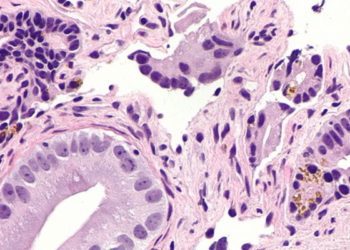Androgen deprivation therapy is not associated with overall mortality in prostate cancer patients with COVID-19
1. In this retrospective cohort study, there was no significant difference in all-cause mortality between patients with prostate cancer and COVID-19 that received androgen deprivation therapy (ADT) versus those that did not.
2. COVID-19 severity did not differ between those receiving and those not receiving ADT treatment.
Evidence Rating Level: 2 (Good)
Study Rundown: Immunosuppression, often advanced age, and low activity. Male cancer patients are also more at risk of hospitalization due to COVID infection, thought to potentially be due to the role of androgens in immune response regulation. This retrospective cohort study investigated whether androgen-deprivation therapy (ADT) is associated with COVID-19 infection outcomes (mortality and severity). Mortality 30 days after COVID-19 diagnosis of prostate cancer patients treated or not treated with an ADT (bilateral orchiectomy or gonadotropin-releasing hormone analogue, or antagonist given within 3 months prior to COVID-19 diagnosis) was taken from the COVID-19 and Cancer Consortium (CCC19) registry. Severity was measured on a 5-point ordinal scale where 1 = no admission to hospital, 2 = admitted to hospital, 3 = admitted to intensive care unit, 4 = required mechanical ventilation, and 5 = died of any cause within 30 days of COVID-19 infection. Overall, the ADT group (n=266) had more active cancer and metastatic disease than the non-ADT group (n=840). There was no significant difference in all-cause mortality between the two groups; 13% of the non-ADT and 17% of the ADT group died of any cause within 30 days of COVID diagnosis. Older age, Eastern Cooperative Oncology Group (ECOG; a cancer prognostic tool) performance of ≥2, hydroxychloroquine treatment, and having metastatic disease were associated with higher 30-day all-cause mortality after COVID-19. There was no significant difference in COVID-19 severity of patients with or without ADT treatment. While patients on chemotherapy had a higher rate of 30-day all-cause mortality, none of the treatment subgroups differed from ADT alone (16%). A strength of this study was the many cancer and COVID-specific variables that could be accounted for in the statistical analysis due to the retrospective design and robust database. However, the retrospective design limited the availability of variables to those that were collected and the ability to draw causative conclusions. Another limitation of this study is a lack of confirmatory testosterone measurements to validate ADT effectiveness. Additionally, the operational definition of ADT excluded some persons that had received it >3 months before COVID diagnosis but who may still be affected by ADT. Baseline differences between the ADT and non-ADT groups, including the proportion of active and metastatic cancer, make fair comparisons difficult. Finally, this study is limited by the changes in the bandwidth of the healthcare system to manage COVID and changes in COVID virulence at the various times when participants were collected.
Click to read the study in JAMA Network Open
Relevant Reading: COVID-19 and androgen-targeted therapy for prostate cancer patients
In-Depth [retrospective cohort]: Data on the mortality of past and current prostate cancer patients within 30 days of COVID-19 diagnosis was extracted from the CCC19 registry. Patients with more than one cancer diagnosis were excluded. The group of cancer patients treated with ADT was compared to one not receiving ADT at the time of COVID-19 infection. COVID-19 infection severity was analyzed as a secondary end-point. Subgroup analysis also analyzed other prostate cancer treatments, including ARI, abiraterone acetate and prednisone, and cytotoxic chemotherapy. Propensity score matching (PSM) balanced covariates during analysis. Of the 1106 included patients with prostate cancer (median age = 73 years, 9% Hispanic, 23% non-Hispanic Black, 51% non-Hispanic White), 266 (24%) received ADT and 15% had additional therapies. ADT and non-ADT groups were balanced, other than the fact that the ADT group had a higher proportion with active cancer (81% vs 25%) and metastatic disease (56% vs 8%). 14% of participants died of any cause within 30 days of COVID infection, with 13% being in the non-ADT group and 17% receiving ADT ( = 2.59; df = 1; P = 0.11). After PSM, the 30-day all-cause mortality rates of the non-ADT and ADT group were similar at 14% and 15%, respectively ( = 0.02; df = 1; P = 0.88; odds ratio [OR] = 0.77, 95% CI = 0.42-1.42). Regression showed that age (OR = 1.78, 95% CI = 1.30-2.46), ECOG performance of ≥2 (OR = 5.34, 95% CI = 2.49-11.49), treatment for COVID-19 with hydroxychloroquine (OR = 4.33, 95% CI = 2.07-9.04), and having metastatic disease (OR = 2.52, 95% CI = 1.29-4.90) were associated with increased rates of 30-day mortality from COVID-19 infection. There was no difference in terms of COVID-19 severity of patients receiving and not receiving ADT (OR = 0.98; 95% CI = 0.61-1.56). The subgroup of patients receiving chemotherapy had the highest mortality (28% vs 17% on abiraterone acetate vs 16% on ARI), though it was not significantly different from ADT alone (16%) with and without PSM.
Image: PD
©2021 2 Minute Medicine, Inc. All rights reserved. No works may be reproduced without expressed written consent from 2 Minute Medicine, Inc. Inquire about licensing here. No article should be construed as medical advice and is not intended as such by the authors or by 2 Minute Medicine, Inc.

![2 Minute Medicine: Pharma Roundup: Price Hikes, Breakthrough Approvals, Legal Showdowns, Biotech Expansion, and Europe’s Pricing Debate [May 12nd, 2025]](https://www.2minutemedicine.com/wp-content/uploads/2025/05/ChatGPT-Image-May-12-2025-at-10_22_23-AM-350x250.png)





